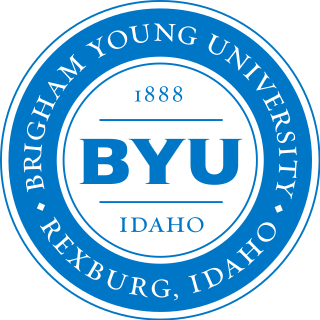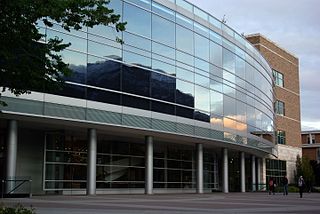
Brigham Young University is a private research university in Provo, Utah. It was founded in 1875 by religious leader Brigham Young and is sponsored by the Church of Jesus Christ of Latter-day Saints.

Brigham Young University–Idaho is a private college in Rexburg, Idaho. Founded 135 years ago in 1888, the college is owned and operated by the Church of Jesus Christ of Latter-day Saints. Previously known as Ricks College, it transitioned from a junior college to a baccalaureate institution in 2001.

The University of San Carlos is a private, Catholic, research, coeducational basic and higher education institution administered by the Philippine Southern Province of the Society of the Divine Word missionaries in Cebu City, Philippines since 1935. It offers basic education and higher education. Founded originally in 1595 as Colegio de San Ildefonso, it later became the Colegio-Seminario de San Carlos in 1783 and finally obtained university charter in 1948.

Cebu Normal University, also referred to by its acronym CNU, is a state research university in Cebu City, Cebu, Philippines established in 1902.

The Church Educational System (CES) of the Church of Jesus Christ of Latter-day Saints consists of several institutions that provide religious and secular education for both Latter-day Saint and non–Latter-day Saint elementary, secondary, and post-secondary students and adult learners. Approximately 700,000 individuals were enrolled in CES programs in 143 countries in 2011. CES courses of study are separate and distinct from religious instruction provided through wards. Clark G. Gilbert, a general authority seventy, has been the CES commissioner since August 1, 2021.
A micro-enterprise is generally defined as a small business employing nine people or fewer, and having a balance sheet or turnover less than a certain amount. The terms microenterprise and microbusiness have the same meaning, though traditionally when referring to a small business financed by microcredit the term microenterprise is often used. Similarly, when referring to a small, usually legal business that is not financed by microcredit, the term microbusiness is often used. Internationally, most microenterprises are family businesses employing one or two persons. Most microenterprise owners are primarily interested in earning a living to support themselves and their families. They only grow the business when something in their lives changes and they need to generate a larger income. According to information found on the Census.gov website, microenterprises make up 95% of the 28 million US companies tracked by the census.
The Marriott School of Business is the business school of Brigham Young University (BYU), a private university owned by the Church of Jesus Christ of Latter-day Saints and located in Provo, Utah. It was founded in 1891 and renamed in 1988 after J. Willard Marriott, founder of Marriott International, and his wife Alice following their $15 million endowment gift to the school.

An Institute of Religion is a local organization that provides religious education for young adults who are members of the Church of Jesus Christ of Latter-day Saints, with those of other religions also welcome to participate. Local institutes may function in church meetinghouses but may also have a stand-alone building situated adjacent to colleges or universities. The LDS Church describes the purpose of the Institute program as "weekday religious instruction for single and married postsecondary students." Institutes of Religion are professionally directed as part of the Church Educational System, with responsibility for the seminary program and the church's higher education institutions, including Brigham Young University (BYU).
The history of Brigham Young University (BYU) begins in 1875, when the school was called Brigham Young Academy (BYA). The school did not reach university status until 1903, in a decision made by the school's board of trustees at the request of BYU president Benjamin Cluff. It became accredited during the tenure of Franklin S. Harris, under whom it gained national recognition as a university. A period of expansion after World War II caused the student body to grow many times in size, making BYU the largest private university of the time. The school's history is closely connected with its sponsor, The Church of Jesus Christ of Latter-day Saints.
Youth Business China, abbreviated YBC, is a non-profit program in the People's Republic of China that aims to promote youth entrepreneurship. It is headquartered in Beijing.
Microfranchising is a business model that applies elements and concepts of traditional franchising to small businesses in the developing world. It refers to the systemization and replication of micro-enterprises. Microfranchising is broadly defined as small businesses that can easily be replicated by following proven marketing and operational concepts.
Ascend: A Humanitarian Alliance is a registered 501(c)(3) nonprofit organization which focuses on international economic and health care development in Africa and South America. Headquarters are located in Salt Lake City, Utah, United States, with full-time offices in Ethiopia, Peru, Bolivia and Ecuador and affiliates in DR Congo, Cape Verde, Ghana, Mozambique, and Sudan. Ascend Alliance operates under the governance of a volunteer board of directors which is composed of business professionals, humanitarians and community leaders. A local group of donors, partners, volunteers, interns, and staff members contribute their time, resources and skills to further the organization's goals. Its leadership is affiliated with the Church of Jesus Christ of Latter-day Saints.
Robert Christopher "Bob" Gay has been a general authority of the Church of Jesus Christ of Latter-day Saints since 2012. He has been a member of the church's Presidency of the Seventy since March 2018. Prior to becoming a general authority, Gay was the managing director, co-founder, and chief executive officer of Huntsman Gay Global Capital (HGGC), a private equity firm headquartered in Palo Alto, California, with offices in Florida, Massachusetts, and Utah.
The BYU Division of Continuing Education (DCE) is a division of Brigham Young University (BYU) that oversees continuing education programs.
Jason Fairbourne is a United States business consultant and educator. He is the founder of the Fairbourne Consulting Group, and is a Peery Fellow at the Ballard Center for Economic Self-Reliance at Brigham Young University’s Marriott School of Management. He is an advocate for microfranchising, defined as the systematization and replication of microenterprises in developing markets.
The Microenterprise Education Initiative (MEI), headed by Dr. Jeremi Brewer, is an initiative that was announced for adoption by the Ballard Center for Economic Self-Reliance, Marriott School of Management, Brigham Young University (BYU) in December 2011. MEI was created with the purpose of becoming an international thought leader in educating NGOs about micro-enterprise education.

Education in Zion is an exhibition space in the Joseph F. Smith Building at Brigham Young University (BYU) in Provo, Utah, United States. The gallery and permanent exhibition documents the history and heritage of education in the Church of Jesus Christ of Latter-day Saints from Joseph Smith to the current Church Educational System (CES). Education in Zion includes stories, film, artwork, photographs, and letters. Temporary exhibits have shown student artwork, information about university services, the history of specific CES schools and colleges, and connections between academic subjects and scriptures. The gallery hosts a number of recurring events and lectures. Students viewing the exhibition have felt a renewed appreciation for their education.

BYU–Pathway Worldwide (BYU–PW) is a higher education organization of the Church of Jesus Christ of Latter-day Saints. It was formed in 2017 and is responsible for online higher education within the Church Educational System.

Philanthropies, formerly LDS Philanthropies, is a department of the Church of Jesus Christ of Latter-day Saints and is responsible for facilitating donations to humanitarian and educational initiatives. The department works under the direction of the church's Presiding Bishop. The most widely known educational projects are the operation of church-owned schools, such as Brigham Young University (BYU). Humanitarian funds are given to Latter-day Saint Charities which sponsors and organizes relief efforts. In 2019, the church reported over 3,000 community-based projects with an excess of 2,000 partners, in locations around the world. A 2020 statistic reported a total of $2.3 billion that had been donated over Philanthropies' existence.








